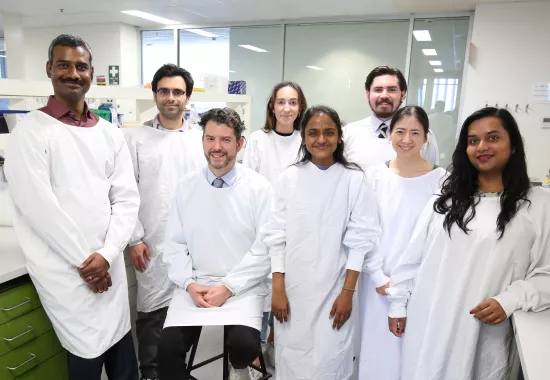Our researchers at the Kolling Institute are at the forefront of Meniere’s disease science developing the first humanised model of the disease ahead of gene therapy.
The specialised team is led by world-leading Meniere’s disease researcher and neuroscientist Professor Jose Antonio Lopez-Escamez who relocated from Spain to the institute to pursue his ground-breaking work.
His talented team of seven is set to grow to a dozen by 2025.
Professor Lopez-Escamez said it was an exciting time for research in this area as we move into precision medicine with specific drugs, and develop gene therapy for the next generation of patients with the disease which causes vertigo and hearing loss.
“We are making encouraging progress as we investigate the genetic basis of the disease, finding that many patients have a recessive inheritance where both parents are carriers of the disease but don’t have any symptoms,” he said.
“When I was working as an ENT surgeon in Spain more than 10 years ago, the condition was largely neglected and not well understood, and many patients were not doing well.
“Today, we are learning more about the disease and the broad range of influences, including immune-response inflammation, allergy and migraine.”
“We are now investigating the genetic mutations involved in the disease in preclinical models in a crucial step towards the development of gene therapy. We believe this game-changing approach will be available within the next 10 years.
“Importantly, we must consider that people will have different genetic and immune backgrounds, and different associated conditions, like migraine.
“It is not the same disease for all individuals and will present differently.
“We don’t have a magic pill that is going to work for everybody with Meniere’s. For some patients some medication will work, one drug will be better. But for others there will be another way.
“That’s why it’s important we know which subgroup of Meniere’s a patient has.”
Global database
Another important part of Antonio’s work is to establish a global website database with genomic information from patients’ blood tests that enable genetic diagnosis in the future.
The database will help researchers, doctors and ultimately patients.
“It will be like a reference portal to train researchers and a tool for doctors,” he said.
“Genetic testing is a very important step to get more knowledge about the basis of many diseases.
“My idea is that any doctor can upload a file on the website and compare individual patients’ data with the reference data that we have generated. It will be useful and accessible.”
